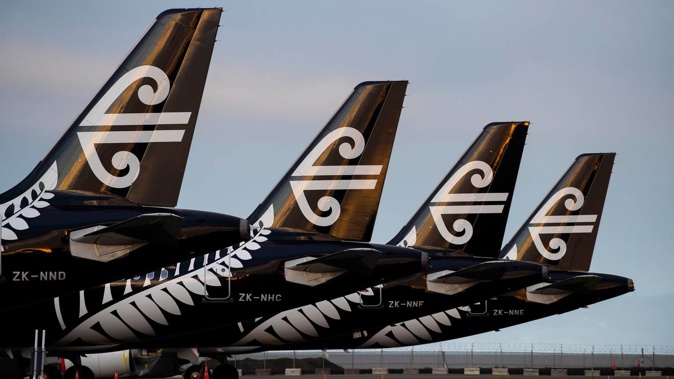
Financial desperation caused by New Zealand’s first Covid-19 lockdown has been blamed for tempting three Air New Zealand baggage handlers with previously clean records into conspiring with an Auckland rapper to smuggle nearly 20kg of methamphetamine on a flight from Los Angeles.
Former airline employees Mark Anthony Castillo, Daniel John Ah Hong and George Aloha Taukolo stood before Judge Richard McIlraith in Manukau District Court today as they appeared for sentencing for one charge each of conspiracy to import methamphetamine.
The judge agreed that sentences of 12 months’ home detention were appropriate for each defendant despite the large amount of methamphetamine that was intercepted.
The decision came after defence lawyer Ron Mansfield, KC, representing Ah Hong and Taukolo, noted that his clients were lifelong hard workers who had supported their extended families with their Air New Zealand salaries.
“Covid had hit and their jobs were at risk,” Mansfield added, reminding the judge of the drastic reduction in airline travel that accompanied Covid-19 restrictions. “It is a situation that created a real sense of desperation.
“The approach [to participate in the scheme] came from others in the community who were more sophisticated. Neither [defendant] appreciated the seriousness of what they were doing... I’m not going to suggest they were preyed upon, but I am going to suggest they were potentially vulnerable.”
The trio - along with musician Romney Fuki Fukofuka, otherwise known by the stage name Konecs - were arrested after Customs uncovered the plot and intercepted 19.4kg of methamphetamine worth roughly $3.5 million as the flight arrived at Auckland Airport in May 2020.
Just five days earlier, Fukofuka, who was born in American Samoa, had departed from Auckland to the United States using his US passport. He was already under surveillance as part of an undercover investigation dubbed Operation Santana, and his quick return amid lockdown raised more red flags.
Fukofuka has also pleaded guilty to his part in the scheme but is not expected to be sentenced until next year.
The prosecution is believed to be the first in New Zealand for an attempted - albeit failed - drug smuggling technique known as “rip on, rip off”. The method involves having inside men at both airports to help steer the contraband away from the usual screening spots.
“I panicked. I made a mistake,” Fukofuka previously told the Herald of how the plan went awry, explaining that he was paranoid due to his own use of methamphetamine.
/cloudfront-ap-southeast-2.images.arcpublishing.com/nzme/CB4S4JOPCAZ3PQIIY2ZJXYWMHU.jpg)
Romney Fukofuka, also known as the musician Konecs, was caught with 20kg of methamphetamine inside Auckland airport during the 2020 Covid lockdown. Photo / Jared Savage
Instead of leaving the baggage at the agreed drop point at Los Angeles International Airport, he took the haul on to the plane with him.
A new plan had to be made on the fly, and it was agreed that Fukofuka would place the carry-on baggage on the luggage carousel upon arrival at Auckland Airport, where the defendants would retrieve it. But Customs officers approached him as he attempted to do so and searched the bag.
Among the items that Customs seized from Fukofuka at the airport were three mobile phones, each of which were found to have encrypted messaging apps. Authorities found a photo of an Air New Zealand work roster on one of the phones.
None of the three defendants who appeared in court today were rostered to work on the morning the drugs were smuggled, but they all showed up to the airport anyway, authorities noted in court documents.
Mansfield said that both of his clients now have new jobs, although not as lucrative as their airline employment. He noted that they are unlikely ever to get jobs again that involve responsibility and trust because of their convictions.
“It’s brought a significant financial burden for the rest of their lives,” he said.
Defence lawyer Annabel Cresswell, who represents Castillo, noted that her client was also remorseful and had a large number of family support. He has an 8-month-old baby at home, she said.
During a sentence indication hearing for Castillo earlier this year, Crown prosecutors Anna Devathasan and Rob McDonald had requested a sentence with a starting point of 10 to 11 years in prison, which would have made home detention unlikely even when taking into account substantial discounts for other factors such as their guilty pleas.
But the judge instead agreed to a “very generous” starting point of four to five years, Devathasan noted today. She requested the judge stick to the new maximum starting point of five years “to be even close to what the Crown would consider adequate”.
Other cases involving such a large haul of methamphetamine have resulted in longer sentences, she argued.
“I strongly object to the cold feet narrative that’s been advanced,” she added. “The timeline just doesn’t support that.”
The judge agreed to a five-year starting point today. But he also said there was a “massive differentiation in roles” between the baggage handlers and others who have been arrested. He noted Cresswell’s “strong submission” that a 10-11 year starting point would have been “out of all proportion to the level of culpability”.
The case is more nuanced than just the weight of the drugs, he said, adding: “These gentlemen were very much in lesser roles.”
He referred to their lack of prior criminal history and a pre-sentence report that suggested they all serve home detention. While there is a need for deterrence, there is also a need to promote the rehabilitation of the defendants, McIlraith said.
“I am extremely confident ... that this was an aberration for all three of you,” he added as the hearing came to a close. “Put in other words, it won’t happen again.”
Take your Radio, Podcasts and Music with you









